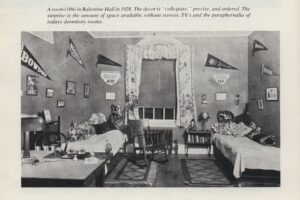
On Friday, Nov. 6, Hauck Auditorium was filled with playgoers, eager to see the University of Maine School of Performing Arts’ rendition of Anton Chekhov’s 1904 play, “The Cherry Orchard.”
Complete with intricate details including real cherry trees, a backdrop painting of a cherry orchard, a slanted stage and an angled ramp — in addition to antique Victorian furniture and costumes — the stage was perfectly set.
Dan Bilodeau, chair of the Division of Theatre and Dance at UMaine, designed the set for the play. He has been the scenic designer for past plays at UMaine. Bilodeau explained that with designing sets, the basic shell model is always the same. He uses dioramas to create intricate details of what the set should look like, and typically starts working on the fall play’s set in August.
“It is usually in the last week that the play comes together, once you add the costumes, lighting, and sound to the set,” Bilodeau said.
Actors started auditioning for the play on Sept. 9. The cast is comprised of 16 actors from UMaine.
Bilodeau explained that the week before the play, on a Saturday, the whole cast and technicians came together for a “work haul” day, where everyone works on touching up the set.
“It is kind of a massive operation,” Bilodeau added.
Bilodeau has been at the university since 2008, and previously attended graduate school for scenic design. He studied theater as an undergraduate, and always had a tendency toward being a theater technician rather than an actor.
“I designed corporate theater for three years, then went back to teaching and my roots of theater design,” Bilodeau said.
Nicole Felix, a second-year student at UMaine, was stage manager for the play. A theater student, she auditioned for the play at first, but was not offered a role. She later was offered the position of stage manager, a position she never had before this year.
“I like to be a well-rounded actor,” Felix said of her decision to become stage manager.
Felix has previously worked backstage as a choreographer, make-up artist, props master, hair artist and assistant stage manager. She has also acted in “Love’s Labour’s Lost,” “Little Shop of Horrors” and “Villain Cabaret.”
“It really opened my eyes into how much goes into a show and how much a stage manager does,” Felix added.
Felix explained that as stage manager, she attended every rehearsal, wrote down all the blocking (stage movements and directions) for actors, and helped the director, Marcia Douglas. During the show, Felix worked with sound and lighting, and kept contact with the back stage.
“I am kind of the voice to all the other branches,” Felix added.
Felix agreed with Bilodeau that the play does not start really coming together until the final week. Felix explained that the set started really coming together with the addition of the ramp and the platform. Additionally, she said that it changed everything to see the actors perform in costume.
“It was mind boggling to see how far the show has really come,” Felix said.
Alan Estes, an actor in the play who played the role of Fiers, a house servant, is a third-year theater student at UMaine. He has performed in a number of productions at UMaine before, including “Godspell,” “Little Shop of Horrors,” “Love’s Labour’s Lost” and “Metamorphoses.” Estes explained that he has been involved in plays every year at UMaine.
“With the set being worked on and being part of it, the play has come to life,” Estes said.
He explained that the costumes and hair are all accurate to period (1904.) Estes added that with the costumes and the real cherry trees, the play started to come to fruition.
Estes explained as an actor, he rehearsed six days a week — every weekday and Sunday afternoons. During tech week, he acted every day.
“It has been mostly come in and do what you love and be a part of a cool process,” Estes added.
On Tuesday before the opening weekend, both Felix and Estes were on the stage set painting.
Director Marcia Douglas could not be reached for an interview. However, in the director’s note of the program, she explained rehearsal procedures.
“As we have rehearsed this play, we have found that each character is like the tip of an iceberg. Rarely do characters see deeply into each other. They pass and try to touch but fail more often than they succeed. Chekhov knew people and in his unique way he brought that to the stage.”
Douglas, whose first on-stage role was in “The Cherry Orchard” at her alma mater Colorado State University, holds the play near to her heart.
“I had never had to talk onstage. It was terrifying, but it was life changing. That was 50 years ago,” Douglas told The Maine Campus in September. “It’s just time for me to do this play. I really hold it dear and I’m really excited for it.
In September, Douglas also explained Chekov’s plays reinvented the way plays were written and performed, focusing more on the ensemble instead of one main actor.
“The big parts and the small parts, backstage technicians and designers — it takes everyone together to make a theatrical piece. This was a new idea at the time,” Douglas said. “Everybody’s creativity is involved. The result of that kind of work is way more than any one person could do.”
Chekhov died in 1904 from consumption (tuberculosis) soon after the first performance of “The Cherry Orchard” was performed at Moscow Art Theatre. While many people view Chekhov’s plays and “The Cherry Orchard” as a challenge for actors, UMaine students fully embraced the challenge and encompassed the characters..
“If you saw a rehearsal a week ago, we were in a completely different place,” Bilodeau said.
But opening night, actors on stage were comedic, enthusiastic and proved that they were not at all daunted by the historic play.








